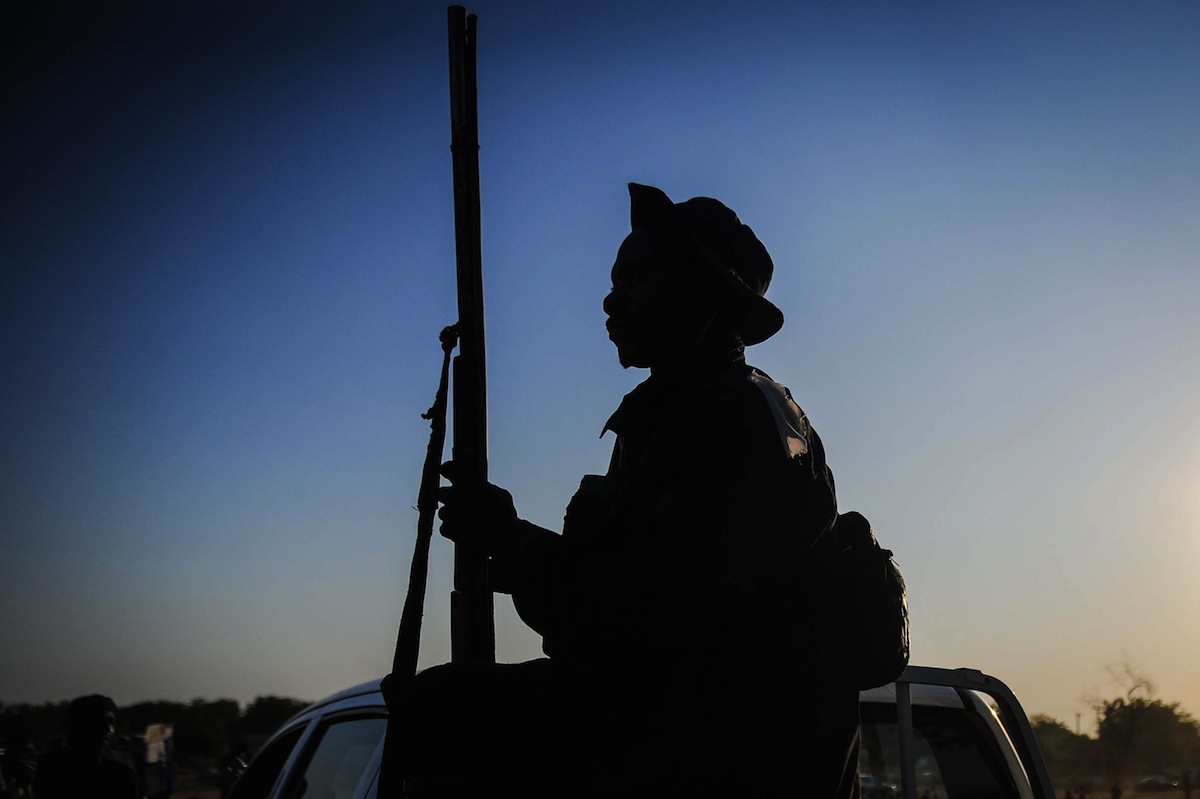

This post is in partnership with the History News Network, the website that puts the news into historical perspective. The article below was originally published at HNN.
The raging Boko Haram terrorist campaign poses the most potent existential threat to Nigeria since the country emerged out of civil war in 1970. Almost daily, insurgents fired up by a strange concoction of Islamist ideology and ascetic inclinations rampage through villages in the Nigerian northeast, killing, burning, and maiming. The Nigerian army’s law-and-order approach is foundering, and the insurgency waxes stronger, spreading to new territories within Nigeria and in the neighboring countries of Cameroon, Chad, and Niger.
How did it come to this, and how can one situate Boko Haram in a longer historical tapestry of religious revivalism, societal convulsion, social marginality, and colonialism in this region of Nigeria? To understand Boko Haram, one must detour to precolonial and colonial histories of Northern Nigeria and locate the coextensive influences of pre-colonial Islamism and British colonial education policy.
An Ironic Product of Western Educational Lag
Translated from Hausa, Boko Haram means Western education is forbidden. The name references the opposition of the group to Western education and other artifacts of Western modernity. To understand this theological rejection of Western education, one must probe how the sociological currents that produced Boko Haram are ironically rooted in a history of Western education, or lack thereof, in Northern Nigeria.
Northern Nigeria became a British Protectorate in 1900 and colonial control was consolidated between then and 1907. Wary of alienating Muslim elites whom the colonizers were cultivating as allies in their rule, British colonial authorities decreed a ban on Christian missionary activities in the Muslim emirates, cutting off these regions from the missionary educational enterprise, the major instrument for the spread of Western education in much of colonial Nigeria and Africa.
The spread of Western education in the emirates was further hampered by another factor: the widespread suspicion that Western education was a carrier of un-Islamic ideas. Some emirs told Frederick Lugard, the first British governor of Northern Nigeria, that they didn’t want missionary educators in their domains because they feared that the missionaries would try to convert their Muslim subjects to Christianity.
This attitude was tempered over time by a realization on the part of some of the colony’s aristocrats and regular colonial subjects that secular education was important to socioeconomic mobility in colonial society. But colonial authorities ignored this attitudinal shift and did not build many schools in Northern Nigeria because of a racist ideology that questioned the value of liberal (as opposed to vocational) Western education for African “natives.” Specifically, British colonial officials in the North believed that liberal education would corrupt Northern Nigerians, turning them into agitators for rights in colonial society like it had purportedly done to the indigenous intelligentsia of Southern Nigeria. The British despised members of this embryonic indigenous elite with a passion and described them in colonial sources in derogatory terms as confused, troublesome, undignified black Englishmen wannabes. Frederick Lugard and other colonial officials were determined that the Northern, Muslim-majority half of the country would not be afflicted with this dangerous virus of educational modernization.
The foundation of the educational lag in the Muslim-majority states of postcolonial Northern Nigeria was thus laid by colonial policy, which was founded on the theory that a rapid expansion of Western education would damage the minds of benighted “native” Muslims and turn them against colonization.
This foundational problem has been compounded over the years by the inattention of postcolonial governments in the northeastern and northwestern states to education and, more recently, by a resurgence of negative attitudes to Western education, itself a product of the influx into Northern Nigeria of global Islamist ideologies denouncing or devaluing secular education as a source of societal moral degeneration, a contention eerily reminiscent of the claims of old Islamic revival movements in the region who similarly lashed out at colonial modernity and boko, or secular Western education.
The product of this Western educational lag in the northeast is the vast army of youths who, lacking credentialed Western education, are marginal in Nigeria’s secular economy and are thus available for Boko Haram to mobilize with temporal and spiritual promises of relevance.
Homegrown Islamist Dissidence
In addition to the British inattention to Western education in the Muslim majority areas of colonial Northern Nigeria, the Muslim rulers of these regions, inheritors of centuries old Islamic traditions and descendants of Muslim reformers of the early nineteenth century Sokoto Caliphate, feared that Western education would undermine their authority, dishonor the legacy of this history of Muslim revival, and spread practices offensive to widely held beliefs about Muslim piety.
A similar invocation of a romanticized Muslim past and nostalgia for prior Muslim dissidence has become part of Boko Haram’s rhetorical repertoire. In a recent video, the group showed archive footage of a battle between British soldiers of conquest and forces of the Sokoto Caliphate at the turn of the 20th century, suggesting that Boko Haram propagandists equate their struggle with the earlier struggle of the Sokoto Caliphate against British colonialism and its secular institutions.
Boko Haram has often invoked the Islamic Umma and caliphate founded by the Fulani jihad of Othman dan Fodio in the first decade of the nineteenth century in Hausaland as a model for its ambitions. Moreover, the group seems to have adopted the military tactics of the Jihadists of old. Like the Fulani jihadists, Boko Haram would march into a community in two columns. One would wait in the rear of the community while the other would attack from the front. Panicky villagers seeking escape would be slaughtered or captured by the rear column. This was a tactic that had been perfected by the Fulani jihadists as they raided non-Muslim communities for slaves and treasure throughout the nineteenth century.
Boko Haram belongs in a long line of Islamic insurgencies in the area. In the Sokoto caliphate, there were the Digawa, the Salihawa, the Isawa, and other sects with diverse doctrines considered heretical by the mainstream Sunni Umma. The Isawa in particular ran egregiously afoul of the existing theological consensus of the caliphate by recognizing the messianic status of Jesus and integrating that belief into their Muslim devotions.
Like Boko Haram, these groups criticized the existing Islamic order of the nineteenth century, isolated themselves, and espoused doctrines unfamiliar to the normative Sunni theologies of the caliphate. Unlike Boko Haram they were small, largely non-violent, and fizzled out over time.
In colonial times (1900-1960), some of the pre-colonial Islamic insurgent groups persisted, some coalescing into movements resistant to both the British and the emirate system of traditional and religious leadership. The Mahdist movement, an apocalyptic sect built around the idea of a coming messiah (or the Mahdi) and an end-of-time showdown between him and the forces of oppression, emerged as a fulcrum of opposition to the British colonial conquest in the first decade of the twentieth century. The British crushed the last of these major Mahdist uprisings in the village of Satiru in February 1906 and the surviving Mahdists fled to safety in different directions — to Kano, Yola, and as far as modern Sudan.
The British continued to sporadically face smaller incarnations of earlier Islamist revolts in the period of colonial rule. Some of these movements began to articulate a clear message against Christians (Nasara), a category represented in their expedient theology by the British colonialists, and against modernity, represented by British systems of rule, colonial technologies, Western education, and Muslims who adopted them.
Confronted by a changing world marked by the erosion of traditional ways of life and by a dizzying cocktail of modern goods and practices that they associated with Christian British colonizers, some Muslims responded by adopting a new form of piety designed to provoke divine solutions to what they saw as a Christian modernist invasion. Subsequent Islamist insurgent groups in Northern Nigeria have sustained this angst against modernity (zamani), which is perceived as a threat to the vision of a just, moral Islamic society. The resentment is often extended to Christians who purportedly embody this modernity, and to Muslims who allegedly imitate it or allow it to infect their Muslim devotion.
There is thus a long precedent for homegrown Islamic dissidence in Northern Nigeria. The most recognizable postcolonial manifestation of this history of insurgent Islamic revival, especially in the northeast, is the Y’antatsine movement, an Islamist Luddite sect that flourished intermittently in the northwest and northeast between 1980 and 1985. Like Boko Haram, the group isolated itself, received both persecution and patronage from some politically powerful Muslims, and then turned violent when clashes between its members and mainstream Muslims became frequent and its alternative Islamic community, or Tsangaya, was attacked by the secular authorities of the state.
Yet Boko Haram differs in several respects from Y’antatsine. The latter was a largely urban movement with easily identifiable neighborhoods such as Yan Awaki in Kano and Bulunkutu in Maiduguri. Conversely, Boko Haram is now largely a rural insurgency, although it has a presence in both rural and urban areas. Yantatsine was numerically much smaller than Boko Haram.
Y’antatsine was not a radical territorial movement intent on capturing, holding, and governing territory as part of an imagined theocratic state or caliphate; Boko Haram is. Boko Haram boasts of its allegiance and connections to global networks of jihad and Islamism, which it references in solidarity in its videos. Y’antatsine was a wholly homegrown Islamist movement with no known connections to foreign Islamist currents.
The two parallel histories of colonial educational policy and Islamic dissidence constitute the premise upon which understandings of Boko Haram’s ideology and rampage should be constructed. Yet, this historical connection alone cannot explain Boko Haram, for the group is both connected to and removed from this history. Its theological corpus is more expansive and its methods for realizing its goals more violent than previous insurgencies.
Moses E. Ochonu is Associate Professor of African History at Vanderbilt University. His most recent books are “Colonialism by Proxy: Hausa Imperial Agents and Middle Belt Consciousness in Nigeria” (2014), and “Africa in Fragments: Essays on Nigeria, Africa, and Global Africanity” (2014).
More Must-Reads from TIME
- Donald Trump Is TIME's 2024 Person of the Year
- Why We Chose Trump as Person of the Year
- Is Intermittent Fasting Good or Bad for You?
- The 100 Must-Read Books of 2024
- The 20 Best Christmas TV Episodes
- Column: If Optimism Feels Ridiculous Now, Try Hope
- The Future of Climate Action Is Trade Policy
- Merle Bombardieri Is Helping People Make the Baby Decision
Contact us at letters@time.com